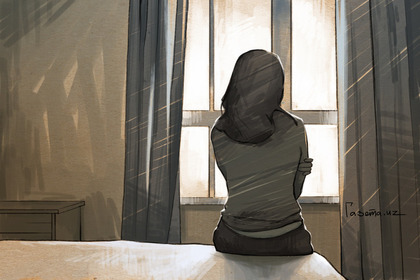The problem of violence against women remains relevant in many countries, including Uzbekistan. These are not mere statistics. These are real people - wives, mothers, daughters, who face physical and psychological violence.
When women are silenced, when they are removed from power, when their rights are ignored, unbearable consequences arise. According to the Institute for War and Peace Reporting in Uzbekistan, in recent years there has been an alarming increase in the number of suicides among women. According to Deputy Prime Minister Dilbar Gulyamova, 99% of such tragedies are due to domestic violence, not economic factors. These are not just numbers. These are humans and their unhappy lives behind.
Nevertheless, despite the seriousness of the situation, there are many reasons for hope. In recent years, the government has begun to take steps aimed at improving the situation of women. Since 2016, with the new administration of the President Shavkat Mirziyoyev, a number of legislative changes have been introduced, such as the recognition of the concept of “domestic violence” and programs to expand women’s access to education and leadership positions. One of the most striking examples is the work of Saida Mirziyoyeva, who actively promotes initiatives to protect women’s rights. This is inspiring and makes it clear that change is possible. But we cannot be satisfied with legislative initiatives alone. The problem is deeper. It lies in the existing patriarchal stereotypes that are so ingrained in society that even violence itself is often perceived as something normal. Women still face ridicule and accusations if they decide to speak out about violence, and society continues to blame them for “it’s their own fault.” Let’s remember the story of one woman from Tashkent who, after she decided to speak out about violence from her husband, found herself in a position where she had to fight not only for her safety, but also for the right to be heard. She could have become one of the statistics if not for the support of human rights organizations, with which she was able to stand up for her rights. This is a reminder of how important it is to create a system in which every voice is heard.
Root Causes of the Problem
The main cause of violence is not only physical and psychological pressure, but also the mental model in which a man is the head of the family, and a woman is a subordinate element. In traditional Uzbek families, this model will persist for a long time until the upbringing and education of future generations begins to change. We have all heard how older generations say that “a woman should remain silent when she is offended,” or “a man is always right.” These are not just words - this is an ideology that destroys the lives of millions of women.
As more and more women find their voice, it is important to destroy the stereotypes that support violence. This is important not only for women, but also for men, because every person has the right to live without fear. On the streets of Uzbekistan, we meet more and more women who are ready to fight for their rights, and this is important. The Role of International Treaties and Legislation
International treaties, such as the Convention on the Elimination of All Forms of Discrimination against Women, play a key role in the development of women's rights. The Constitution of Uzbekistan clearly states the equality of men and women. However, the real situation, as practice shows, sometimes differs greatly from the norms prescribed in the laws. Remember the law on the protection of women's rights, which appeared in Uzbekistan, but in fact its implementation faces numerous obstacles, including weak law enforcement and insufficient public awareness. Women need more than just laws - they need protection, support and opportunities.
Solutions
Solving the problem of violence requires a comprehensive approach. This is not just the adoption of new laws, it is the education of a new society based on respect, equality and support. Here are some key steps:
1. Education as the basis for change. Education is not just access to knowledge, it is the foundation for the formation of a new generation free from biased stereotypes. Programs that teach children, men and women equality and mutual respect can be a catalyst for long-awaited change.
2. Support and protection systems. More centers, psychological help and hotlines for women who have been subjected to violence are needed. The story of one of the victims, who after many years of silence found support from human rights defenders and social services, shows how important it is to have real help when hope fades.
3. Reducing the influence of patriarchal attitudes. This can be achieved through campaigns to destroy stereotypes. For example, programs aimed at men teach them to perceive women as equals, not as subordinates.
4. Strengthening the legal system. Laws must work. These are not just words, they are a vital condition for women to be confident in their safety and protection. It is necessary not only to adopt laws, but also to monitor their implementation.
5. Supporting women's involvement in socio-political life. Women's participation in politics and business creates the basis for change. Examples of women leaders, such as Saida Mirziyoyeva, inspire us that if we give women a chance, they can change a lot.
With every step we take, with every voice we hear, we break the vicious circle of violence. After all, if women are not afraid to speak out, if they have the opportunity to change their destiny, then society will change too. We see how women's lives in Uzbekistan are gradually getting better. Women are already beginning to believe in their right to happiness, freedom, and safety.
The world will not change in one day, but with every step we take we are getting closer to equality and justice. And each of us can be a part of this process.
Anora Rajabova














